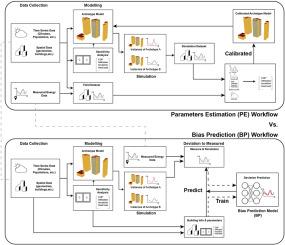Bias prediction vs. parameter Estimation: Calibration Framework comparison for urban Building energy modeling considering application scenarios
IF 10
1区 环境科学与生态学
Q1 ENGINEERING, ENVIRONMENTAL
引用次数: 0
Abstract
Accurate Urban Building Energy Modeling (UBEM) is always a prerequisite during the design of a city's climate actions, plans and renewals, but is often subject to limit information of buildings and usage in large scale. Thus, researchers often simplify the UBEM models and improve the accuracy through calibration. Result-based bias prediction (BP) and parameter-based estimation (PE) are the two of the most-commonly-used calibration frameworks, but the data requirements, capability boundaries, and applicable scenarios are still unclear in previous studies due to the insufficient sample space. Therefore, the study carried out a systematic comparison between the two calibration frameworks through a case study on 3442 public buildings with 256,968 monthly electricity consumption records. Nine types of buildings' energy consumption were modelled and simulated, in which the PE provided calibrated archetype models, and the BP provided the prediction on primary simulation bias. As a conclusion, the BP showed better accuracy, generalization, and robustness crossing different tasks than the PE did, and so would be more feasible for most of the analytical simulations focusing on an accurate energy assessment, especially those in building maintenance or Urban Sustainability Assessment scenarios. The PE was suggested if the persistence on model interpretability to explain the composition or sensitivity of energy consumption overperform the accuracy, which is widely required in design stage. In addition, the implementation of Transfer Learning could improve BP targeting at mix-use building simulations. This study contributes to the selection of calibration methods cross the main UBEM applications.

偏差预测与参数估计:考虑应用场景的城市建筑能源建模校准框架比较
准确的城市建筑能源模型(UBEM)一直是城市气候行动、规划和更新设计的先决条件,但往往受到建筑物和大规模使用信息的限制。因此,研究人员经常简化UBEM模型,并通过校准来提高精度。基于结果的偏差预测(BP)和基于参数的估计(PE)是两种最常用的校准框架,但由于样本空间不足,以往的研究对数据需求、能力边界和适用场景尚不清楚。因此,本研究以3442幢公共楼宇的256,968个月用电量记录为个案,对两种校正架构进行系统比较。对9种类型的建筑能耗进行了建模和仿真,其中PE提供了校准的原型模型,BP提供了初级仿真偏差的预测。综上所述,BP在不同任务间表现出比PE更好的准确性、泛化性和鲁棒性,因此对于大多数侧重于准确能源评估的分析模拟,特别是在建筑维护或城市可持续性评估场景中,BP更为可行。如果坚持模型的可解释性来解释能源消耗的组成或敏感性,而不是准确性,这是在设计阶段普遍要求的PE。此外,迁移学习的实施可以提高BP针对混合用途建筑模拟的目标。该研究有助于跨主要UBEM应用选择校准方法。
本文章由计算机程序翻译,如有差异,请以英文原文为准。
求助全文
约1分钟内获得全文
求助全文
来源期刊

Journal of Cleaner Production
环境科学-工程:环境
CiteScore
20.40
自引率
9.00%
发文量
4720
审稿时长
111 days
期刊介绍:
The Journal of Cleaner Production is an international, transdisciplinary journal that addresses and discusses theoretical and practical Cleaner Production, Environmental, and Sustainability issues. It aims to help societies become more sustainable by focusing on the concept of 'Cleaner Production', which aims at preventing waste production and increasing efficiencies in energy, water, resources, and human capital use. The journal serves as a platform for corporations, governments, education institutions, regions, and societies to engage in discussions and research related to Cleaner Production, environmental, and sustainability practices.
 求助内容:
求助内容: 应助结果提醒方式:
应助结果提醒方式:


